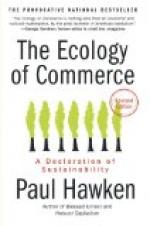|
This section contains 514 words (approx. 2 pages at 400 words per page) |

|
The Ecology of Commerce Revised Edition: A Declaration of Sustainability Summary & Study Guide Description
The Ecology of Commerce Revised Edition: A Declaration of Sustainability Summary & Study Guide includes comprehensive information and analysis to help you understand the book. This study guide contains the following sections:
This detailed literature summary also contains Topics for Discussion on The Ecology of Commerce Revised Edition: A Declaration of Sustainability by Paul Hawken.
The Ecology of Commerce by Paul Hawken addresses the topic of business and its effect on the environment. According to Hawken, businesses don't have to destroy the environment. Rather, business can become the catalyst to change and save the environment.
Instead of thinking simply of profit, businesses need to integrate human, economic and biologic systems. In the past, at the beginning of the Industrial Revolution, resources seemed unlimited. With the expansion of business and global trade, resources have become limited. Now, the world cannot sustain itself. We all take too much, and there isn't time to replace the natural resources destroyed.
We also waste too much. Recycling cans in an office is barely the tip of the iceberg to the real problems. Businesses create waste that has an environmental impact we can't immediately see. One of the biggest problems is chlorine. Organochlorine is one among dozens of concerning man-made poisons in the environment that have a significant impact on health and sustainability.
Corporate America seems to be satisfied with the idea that the health of the ecosystem is defined separately from businesses and jobs. They need to understand that businesses can actually help restore society and the environment. There has to be a design for the future to make things better for everyone. An example of this is the "intelligent product system" proposed by Dr. Michael Braungart and Justice Englefried of the Environmental Protection Encouragement Agency in Hamburg, Germany.
The idea of the free market also needs to be addressed. Markets are not the same as they used to be, but this doesn't have to be bad. A cost/price integration, as proposed by Nicholas Pigou, could lead to a more stable economy and a healthier environment. There also needs to be more of a balance between small businesses and large businesses. The environmental impact of big businesses must be taken into consideration.
America today is very different from the country originally founded. The country was initially created by people trying to escape governmental and organizational oppression. Now it is a country with peoples oppressed by corporations and business. In pursuit of business success, the people focus on work and don't seem to realize that the standard of living is not increasing.
Instead, we turn a blind eye to the effects of our pursuit to gain financially, and corporations continue to grow in power, influencing governmental decisions that often block initiatives to improve our world socially and naturally. Small businesses have to fight for a chance against big businesses, yet they provide the foundation for change. With a focus on sustainability, small businesses can educate customers, create environmentally-friendly products, and give back to the earth and community.
Most of the earth-friendly initiatives reward the wealthy, but there needs to be a global effort that transcends location and social status. Green fees and green taxes can address serious environmental issues, benefiting everyone. Instead of fearing the future, changes need to be made to face it. This book offers broad-based and specific guidelines that, if utilized, could offer hope for the future.
Read more from the Study Guide
|
This section contains 514 words (approx. 2 pages at 400 words per page) |

|



